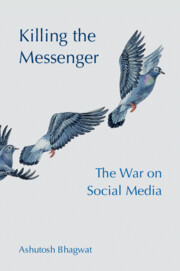
-
Select format
-
- Publisher:
- Cambridge University Press
- Publication date:
- 05 September 2025
- 25 September 2025
- ISBN:
- 9781009547703
- 9781009547680
- 9781009547659
- Creative Commons:
-
This content is Open Access and distributed under the terms of the Creative Commons Attribution licence CC-BY-NC 4.0.
https://creativecommons.org/creativelicenses - Dimensions:
- (229 x 152 mm)
- Weight & Pages:
- 0.46kg, 212 Pages
- Dimensions:
- (229 x 152 mm)
- Weight & Pages:
- 0.32kg, 212 Pages
Open AccessYou have digital access to this book
Book description
Killing the Messenger is a highly readable survey of the current political and legal wars over social media platforms. The book carefully parses attacks against social media coming from both the political left and right to demonstrate how most of these critiques are overblown or without empirical support. The work analyzes regulations directed at social media in the United States and European Union, including efforts to amend Section 230 of the Communications Decency Act. It argues that many of these proposals not only raise serious free-speech concerns, but also likely have unintended and perverse public policy consequences. Killing the Messenger concludes by identifying specific regulations of social media that are justified by serious, demonstrated harms, and that can be implemented without jeopardizing the profoundly democratizing impact social media platforms have had on public discourse. This title is also available as open access on Cambridge Core.
Reviews
‘In response to widespread but unproven assumptions that social media is harming society, governments are regulating social media in a variety of ways. Prof. Bhagwat brings a clear-eyed sensibility to reviewing those efforts, repeatedly demonstrating how censorship ‘solutions’ are often worse than the problems regulators seek to redress.’
Eric Goldman - Professor, Santa Clara University School of Law and Co-Director, High Tech Law Institute
‘Killing the Messenger is a well-researched and lucidly-written book that challenges policy makers, judges, and legal scholars alike to measure (at least) twice before cutting once to avoid doing more harm than good when regulating social media platforms. Along the way, Professor Ash Bhagwat advocates for thoughtful, common-sense reforms that could successfully remedy some of the most pressing social problems commonly attributed to new media entities.’
Ronald J. Krotoszynski, Jr - John S. Stone Chair and Professor Law, University of Alabama
‘An important read. Bhagwat offers a much-needed antidote to the moral panic about social media that is everywhere these days. As he explains, we face real problems, but we need to look to ourselves and our institutions, not just social media, for the cause of those problems.’
Mark A. Lemley - William H. Neukom Professor, Stanford University
‘Thoughtful, fair-minded, and enlightening; highly recommended.’
Eugene Volokh - Thomas M. Siebel Senior Fellow, Hoover Institution, Stanford University
Contents
Full book PDF-
Killing the Messenger
pp i-ii -
-
- You have access
- Open access
- HTML
- Export citation
-
-
Killing the Messenger - Title page
pp iii-iii - The War on Social Media
-
-
- You have access
- Open access
- HTML
- Export citation
-
-
Copyright page
pp iv-iv -
-
- You have access
- Open access
- HTML
- Export citation
-
-
Contents
pp v-vi -
-
- You have access
- Open access
- HTML
- Export citation
-
-
Acknowledgments
pp vii-viii -
-
- You have access
- Open access
- HTML
- Export citation
-
-
Introduction
pp 1-8 - Social Media as the Mirror of Our Times
-
-
- You have access
- Open access
- HTML
- Export citation
-
-
1 - The Conservative War
pp 9-25 - Social Media as Censors
-
-
- You have access
- Open access
- HTML
- Export citation
-
-
2 - The Progressive War
pp 26-50 - Social Media as Enablers
-
-
- You have access
- Open access
- HTML
- Export citation
-
-
3 - The Data War
pp 51-61 - Social Media Kills Privacy
-
-
- You have access
- Open access
- HTML
- Export citation
-
-
4 - Social Media Platforms as Common Carriers
pp 62-91 -
-
- You have access
- Open access
- HTML
- Export citation
-
-
5 - Social Media as the New Gatekeepers
pp 92-117 -
-
- You have access
- Open access
- HTML
- Export citation
-
-
6 - Making Social Media Pay for Its Sins
pp 118-145 - Repealing or Amending Section 230
-
-
- You have access
- Open access
- HTML
- Export citation
-
-
7 - Privacy, Big Data, and Free Speech
pp 146-163 -
-
- You have access
- Open access
- HTML
- Export citation
-
-
8 - Some Ways Forward
pp 164-190 -
-
- You have access
- Open access
- HTML
- Export citation
-
-
Conclusion
pp 191-194 - Embracing the Unknown
-
-
- You have access
- Open access
- HTML
- Export citation
-
-
Index
pp 195-202 -
-
- You have access
- Open access
- HTML
- Export citation
-
Metrics
Altmetric attention score
Full text views
Full text views help Loading metrics...
Loading metrics...
* Views captured on Cambridge Core between #date#. This data will be updated every 24 hours.
Usage data cannot currently be displayed.
Accessibility standard: Unknown
Why this information is here
This section outlines the accessibility features of this content - including support for screen readers, full keyboard navigation and high-contrast display options. This may not be relevant for you.
Accessibility Information
Accessibility compliance for the PDF of this book is currently unknown and may be updated in the future.

